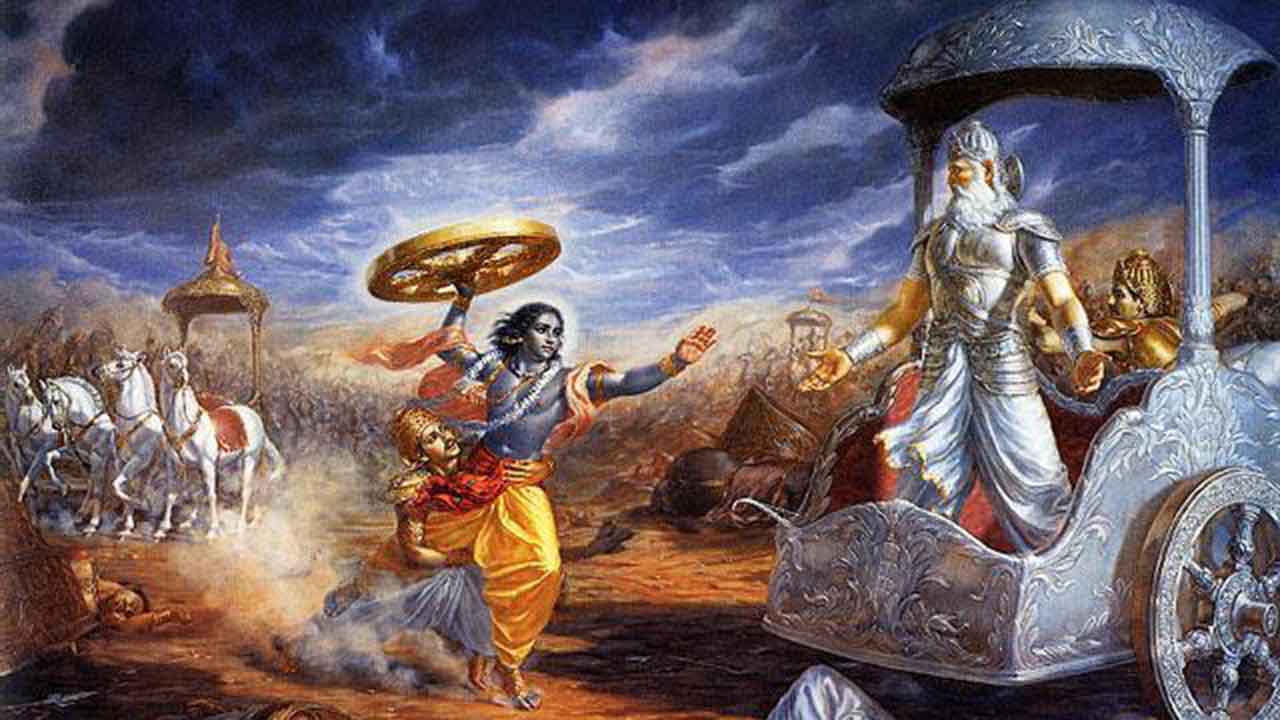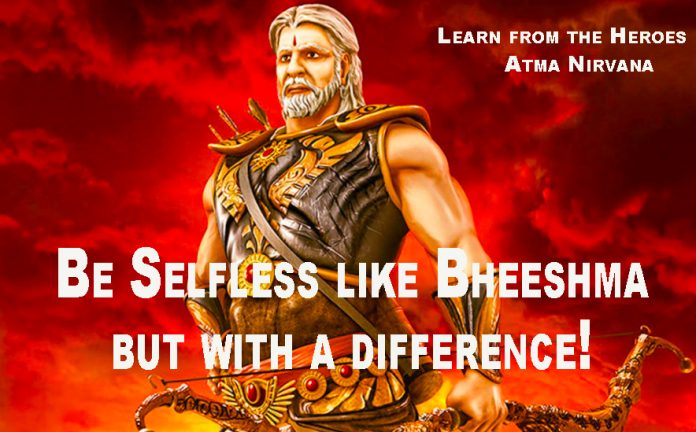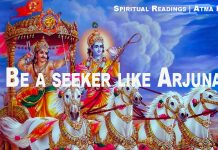’Selflessness’, something divine strikes our mind on hearing this word, isn’t it?
Selflessness is to value more with the needs and wishes of others than one’s own. Being selfless helps us identify and connect with others that itself is rewarding. It helps crush our egos because we are not acting out of pride or for a desire to be recognized. Selflessness helps us act from our heart and soul instead of our ego, tapping into our true desired emotions.
Selflessness! Well, it looks all good till it’s said and read. As a Human being, it’s tough to be so and is rigorous to practice in reality. Only a handful of people can practice Selflessness.
The most selfless of the personalities in the Mahabharata was Bheeshma Pitamaha. Bheeshma means ’one who undertakes a fierce oath (Bheeshma pratigya) and fulfils it.’
Bheeshma’s Birth & Youth
It was Dwaapara yuga and King Shantanu of the Kuru dynasty was ruling over the kingdom of Hastinapura. It is said that Shantanu saw Ganga while strolling along the riverbed and asked her hand in marriage. Ganga agreed to marry but with a condition that Shantanu wouldn’t question any of her actions else, she would leave him. Captivated by her beauty, Shantanu readily agreed and they got married.

As time passed, Ganga gave birth to 7 sons one after the other and shortly after the birth of each one of them, she immersed them in the river. Shantanu dared break their pact, never questioned his wife. Soon, Ganga gave birth to their eighth son and was about to give the baby the same fate as the earlier seven. Shantanu, who couldn’t resist anymore asked her the reason for these extreme actions. Ganga explained to him that, the children were the ’Asta Vasu’s (Eight Sages) who were cursed by Sage Vasishta to be born as humans. Hence, she took the life of seven children to deport them of the curse and the eighth one since saved would live for a long time. They named their child ’Devavrata’ meaning devoted to the divinities. Ganga left Shantanu as per the agreement and took Devavrata with her to train him in all traits.
After sixteen long years, Ganga reappeared and gave back Devavrata to Shantanu. Devavrata had learnt the art of combat from Parashurama and gained knowledge from Vasishta. Soon, he became popular amongst his subjects through his knowledge and war art.

Bheeshma’s Oath
Years passed, one day while walking on the banks of Yamuna, Shantanu came across a young fisherwoman by name Satyavati and asked her to marry. The father of Satyavati agreed to their wedding on a condition that only her son be made the heir for the kingdom.
Shantanu went into a depression and soon Devavrata noticed the change in father’s behaviour. After some enquiry he came to know of the reason for his father’s grief and went straight to Satyavati and her father. There he took an oath that he would never marry, would be a ’Brahmachari’ throughout his life and would always protect the king of Hastinapura. This oath is known as ’Bheeshma Pratigya’ the promise which cannot be broken. On hearing this, Shantanu was pleased and gave a boon to Bheeshma of ’Icchaa Marana’ which means to have control over his death and decide the time of his demise. So, Shantanu and Satyavati got married.
This was the first of the many Selfless sacrifices that Bheeshma made in his lifetime.
Abduction of the princesses and Amba’s Oath
Satyavati gave birth to two children, Chitrangada and Vichitraveerya. As time passed, Chitrangada the crown prince was killed by a Gandharva and Shantanu too departed. Vichitraveerya was crowned the king of Hastinapura. When Vichitraveerya attained manhood, Bheeshma in search of a bride for him reached Kashi where a swayamvara of 3 beautiful daughters of Kashya the King of Kashi was being organised. There he challenged all the warriors and no one dared to rebel against Bheeshma except King Salva who was in love with Amba, the first of the three princesses of Kashi. The battle didn’t last long and Bheeshma overpowered Salva and defeated him and abducted all three princesses. Amba, disappointed with the proceedings, told Bheeshma about her love for Salva. On hearing this, Bheeshma allowed her to go to her love. However, Salva refused her alliance as Bheeshma had won her over combat. Agitated by the rejection, Amba came back to Bheeshma and pleaded him to marry her. Bheeshma, bound by the oath, told her the reason why he cannot marry anyone. Amba sought help from the great Parashurama and asked him for justice. A great war broke out between the teacher and the student and the battle lasted 23 days without any outcome. Parashurama left the scene saying Bheeshma is invincible due to the boon given by his father. Shattered Amba, before jumping into the fire, took an oath that she would be the reason for Bheeshma’s death in her next birth. At the palace, Bheeshma got the sisters Ambika and Ambaalika married to Vichitraveerya.

In this incident, Bheeshma fought with many kings, his own Guru and infuriated Amba to take an oath against him all for his brother’s cause. Selflessness personified.
Birth of Pandu, Dhritarashtra and Vidura
One day, the Vichitraveerya succumbed to an unknown disease and again there was panic in Hastinapura. Veda Vyaasa was called by Satyavati to impregnate Ambika and Ambalika. Ambika gave birth to Dhritarashtra, Ambalika to Pandu and a Daasi gave birth to Vidhura. All these were managed and overseen by Bheeshma.
In this episode of panic too, Bheeshma showed great character and exhibited immense maturity. All these came at the cost of his selflessness to serve the Kingdom.
Further, Pandu was crowned the King and this irked Dhritarashtra who was elder to Pandu but was denied kingship due to his blindness. Dhritarashtra, believed that this happened to him due to Bheeshma, as he was the one who took the decision on the throne. Selfless Bheeshma had to take such a blame from his own brother’s son.
Supervise Pandavas & Kauravas
Pandu had 5 sons-the Pandavas and Dhritarashtra had 101 children-the Kauravas. After Pandu’s demise, Dhritarashtra was made the King. Since he was blind, all administration was managed by Bheeshma. He took care of the Pandavas and Kauravas, hired Gurus like Dronacharya and Kripacharya who taught them the art of combat and knowledge respectively.
Because Bheeshma was selfless, he could make all the sacrifices and bringup his mother’s grandchildren and keep his promise of serving the throne.
The conflict between Pandavas and Kauravas
As Pandavas and Kauravas had disagreements since childhood, Kauravas tricked Pandavas in a game of dice, took away their Kingdom and sent them on exile in the forest for thirteen years. Before sending them to the forest, Kauravas insulted Pandavas and humiliated their wife Draupadi. In all these unfair situations, Bheeshma kept quite owing to his promises and vows.
Later, when Pandavas returned to claim their rightful kingdom, Kauravas refused and the great Kurukshetra War was fought. Bheeshma knowing that the Pandavas were honest and abide by Dharma took the side of Adharmi Kauravas in the war due to his oath to protect the throne of Hastinapur. On the tenth day of the great war, Arjuna with the help of Shikhandi–Amba’s reincarnation laid Bheeshma on a bed of arrows from where he watched the entire war and gave his teachings to Pandavas. Through the boon of his father, Bheeshma waited for Uttarayana and departed his body.

Bheeshma, always committed to sacrifices to keep his vows, without any self-interest. The oath was the only selfish interest of his life. The irony is that in the end, the life-long selflessness turned to selfishness that stimulated all the tragedies. The character Kattappa from the movie ’Baahubali’, who keeps his oath, exhibits selflessness and always is protective of the throne of Mahismati is inspired by the life of Bheeshma.
In our lives too, we can avoid mishaps by making changes as the circumstances and situations demand and differentiate Dharma and Adharma. One should always be aware of who is benefiting from our sacrifices, are they worth it? And act accordingly.
So, be selfless like Bheeshma, but with a difference ’accept and be open to positive changes’.






















































